Tyler John: Representing future generations
By EA Global @ 2020-08-03T20:15 (+14)
This is a linkpost to https://www.youtube.com/watch?v=095kFEA-jpE&list=PLwp9xeoX5p8Nje_8jJsmkz5ork-dVk9wK&index=9
Politics is a notoriously short-termist enterprise. Political institutions generally operate on timescales of two to four years (as the issue of climate change has shown). But this is not necessary or inevitable. In principle, the immense wealth, influence, and coercive authority of national governments could be used to vastly improve the long-term future. In this talk, Tyler analyzes major sources of political short-termism and describes high-priority institutional reforms that could improve alignment between the incentives of present governments and the interests of future generations.
Tyler John is a PhD student in philosophy at Rutgers University-New Brunswick and a Global Priorities Fellow at the Forethought Foundation for Global Priorities Research.
Tyler’s research focuses on long-termist political philosophy and animal moral, legal, and political philosophy. His current constellation of projects is focused on normative arguments for the state to consider the very long-term future, and empirical research into how it could do so effectively.
Before coming to Rutgers, Tyler was a fellow at the Department of Bioethics at the National Institutes of Health Clinical Center. He is also the Education Advisor on the Board of Directors of Faunacción, and he has co-authored a book on chimpanzee legal rights.
We’ve lightly edited a transcript of John’s talk for clarity. You can also watch it on YouTube and read it on effectivealtruism.org.
The Talk
Hi, I'm Tyler John. I'm a PhD student in philosophy at Rutgers University in New Brunswick. Today we're going to be talking about the issue of political short-termism — an issue that's topical and relevant at the current moment.
I'm grateful to all of you for being here with me today. I know I have kind of a captive audience. A lot of you are probably in self-quarantine due to the coronavirus right now, and I appreciate your being here with me in this weird, non-spatial space to talk about political short-termism and representing future generations.
If you're in the effective altruism community, then you probably know about long-termism. It’s the idea that the primary determinant of the value of the actions we take today is going to be their effect on the very long-run future.
The quick and dirty argument for long-termism goes like this: The number of [beings with moral status who will exist] in the future is expected to be extremely large. Humanity, to say nothing about other sentient beings, could live until the earth is no longer habitable — in about a billion years — or maybe even survive the end of the earth, scattered among the stars. When you couple this with the normative assumption that someone's distance from you in time is of no more moral relevance than their distance from you in space, the result is that, [if we can take actions which will] significantly shape the long-term future in positive ways, [those actions] are generally going to dwarf actions that we can take over the short term to benefit currently existing beings.
You might be aware that politics is not exactly a hotbed of long-termism. There's a very well-known problem of political short-termism that is discussed widely in the economics and political science literature, but you'll be familiar with it firsthand. The reason we are experiencing such a bad case of coronavirus right now has to do, in part, with some failures in long-term thinking, especially in the realm of pandemic preparedness and building a strong public health infrastructure system that allows us to respond rapidly to pandemics. And if you've been following the news, a lot of political actors right now are failing to look even 10 days ahead in the future to determine what actions we should be taking now, given how the disease is going to be progressing.
We've also seen this in the context of catastrophic climate change. We're seeing some of the effects of that now, and we're going to continue to see them for a very long time, but political actors are unwilling to do much at the present time to reduce our emissions in a significant enough way to prevent many of its negative effects.
What I’ll talk about today is this issue of political short-termism, the problem of states and political actors being unwilling to take on short-term costs for much larger long-term gains. But before I get into this, I should thank the Forethought Foundation for Global Priorities Research. They funded this project and I've received a lot of support from them. I'm really grateful to them.

The talk will go as follows:
1. I'll talk about why states are so short-termist. Economists and political scientists have studied this a fair bit, and we know some reasons why states [often] aren't able to take on short-term costs for long-term gains.
2. I’ll present some promising reforms that we can make now and in the short term to yield big long-term gains, and make states and global institutions more long-termist.
3. Finally, I'll cover some areas where we could use a lot more research to figure out what kinds of interventions would be beneficial. I’ll list some more speculative possibilities for improving the long-run future through the state, but ultimately we need a really rigorous research program in economics and in the social sciences to try to figure out which institutions are going to be most promising for positively shaping the long-run future.
Why states are short-termist
I've assessed the existing literature on this topic and [unearthed] the different interventions that have been proposed to make states less short-termist. I list 40 or so of them here. 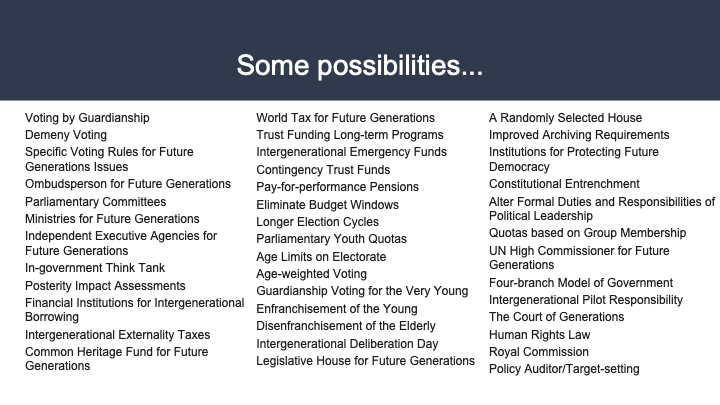
Next, I've started to evaluate these mechanisms in accordance with their effectiveness, feasibility, symbolic value, and other factors. Not a lot of these possibilities are very good ones, and I'm certainly not going to talk about all of them. But they convey the general idea of what we might tackle with respect to reducing political short-termism through institutional reform.
I want to talk about seven of these mechanisms today, but there may be additional options that are promising. And I hope that we can increase this list [significantly] through a research program on political short-termism.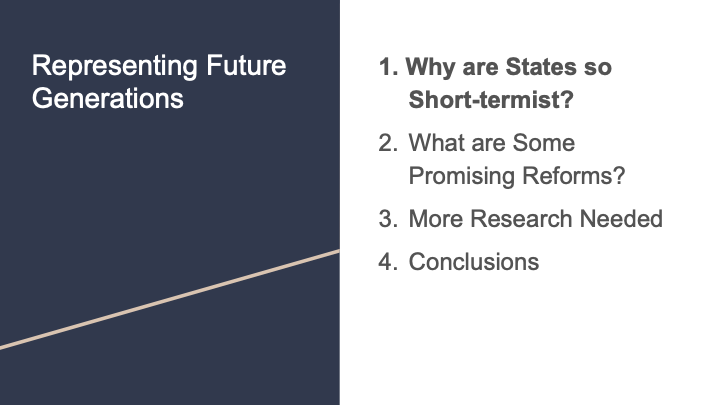
Let's start with the issue of why states are so short-termist in the first place. From there, we can turn to promising reforms.
Economists and political scientists who think about political short-termism tend to divide up the causes or roots of short-termism into three different types of determinants: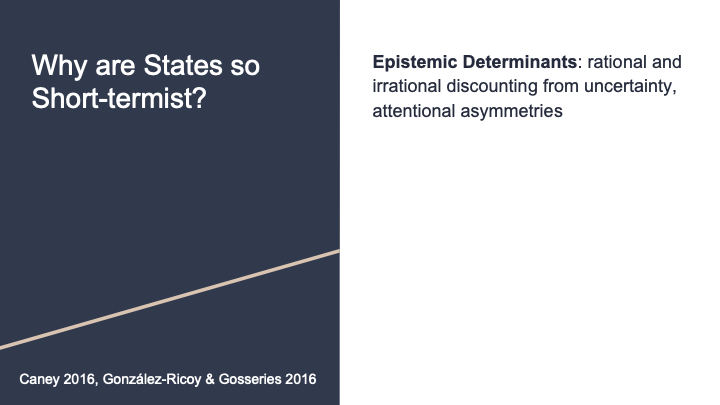
Epistemic determinants. These include rational and irrational discounting from uncertainty. This is not a distinctly political problem. When the future is very uncertain and the benefits of any given policy are unlikely to materialize, it's just rational to discount the expected value of that intervention by the probability of it actually [happening]. But just because this source of short-termism is rational, that doesn't mean it's good. Ideally, we would gather much more information about the kinds of actions that are likely to be beneficial in the future, and then there would be less reason to rationally discount due to uncertainty.
There are many cognitive biases that affect [the way we think] about the long run. There are hot and cold effects. There are vividness effects. (When [the way we imagine the future is] less vivid, possibilities don't seem as likely to us.) We tend to [underestimate] the likelihood of very small probabilities and very bad events. And there's a general issue where all political actors — especially Democrats — economize on the information that they have by turning their attention to more reliable sources of information, rather than speculating about the uncertain future.
For example, when voters try to determine which policies to support, they don't spend much time speculating about what's possible in the future. That takes a lot of cognitive resources. Instead, they look at what has happened in the very recent past, and vote and support policies based on those events. This both reduces our ability to understand long-term effects, and incentivizes politicians to take actions which have short-term visible gains, so that voters will remember that during the next election cycle.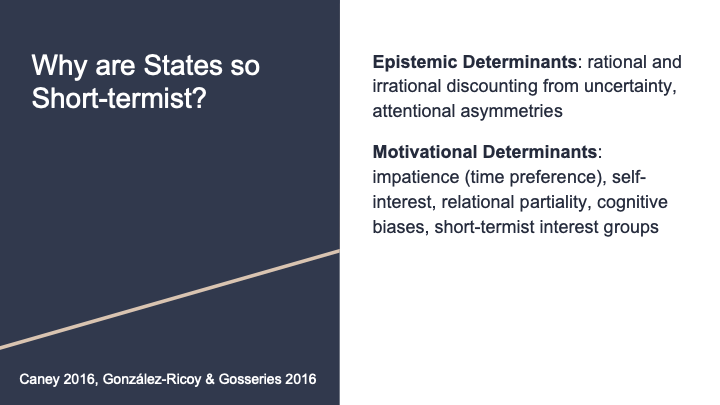
Motivational determinants of short-termism. The most widely studied and discussed of these is pure time preference. People seem to discount future events merely because they're in the future. There's basically no consensus about what the structure of this time preference is and how severe it is. The literature is all over the place on how strong people's time preferences are and when they are biased [in this way]. But there is quite a significant amount of consensus that people have a pure time preference [against] the future.
Second, [people are motivated by] self-interest and relational partiality. Consider this simple, obvious, everyday fact: None of us will ever meet people who don't live at the same time as us. Ourselves, our friends, our family members — everyone we're ever going to interact with are members of currently existing generations. And if we prioritize policy decisions based on our self-interest or what's good for our friends and family, this will then make us more short-termist as well.
There are several other cognitive biases that affect motivation. There's the identified versus statistical lives effect, which we see very starkly in the case of long-term future decisions. And there are a number of short-term interest groups, which motivate politicians to prioritize short-termist policy.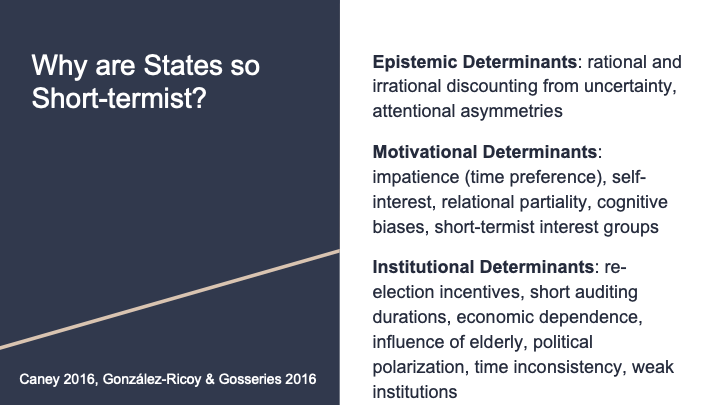
Institutional determinants of short-termism. These are determinants that make political actors unable to take long-termist actions, even when they are properly informed and motivated. For example, there are re-election incentives, which we touched on briefly earlier. Because politicians really want to get elected, they're going to tend to do things that have visible short-term symbolic effects so that voters support them when they go to the polls. Politicians do this rather than trying to impose short-term costs for long-term gain, which will get them booted out of office.
These re-election incentives have been discussed pretty widely, but there are a lot of other institutional determinants:
* There are issues of economic dependence. Political actors are often economically dependent, for fundraising and campaigning, on short-term interest groups.
* The elderly may make society more short-termist, but this, I should say, is extremely unclear. There are some reasons to think that elderly people, by virtue of the fact that they're not going to live as long, and therefore have some self-interested reasons for being short-termist (as well as perhaps some relational reasons to discount future gains), cause the state to be short-termist. But the literature on this is also a mess. It's all over the place. If there is an effect from the influence of the elderly, it's likely pretty small, or we haven't found it yet.
* Political polarization and obstructionism keep political actors from thinking about things in collaborative and thoughtful ways. There are issues of timing consistency, where one political leader can institute a policy which is then repealed by the next person in office. We’ve seen that in a lot of cases where institutions for future generations have actually been implemented. And if we have very weak institutions, we can't take actions which are going to affect the very long term.
So again, we have a wide variety of epistemic determinants, motivational determinants, and institutional determinants. When we're thinking about how to make the state less short-termist and build a long-termist political culture, we need to think about addressing all of these different sources of short-termism.
Promising reforms 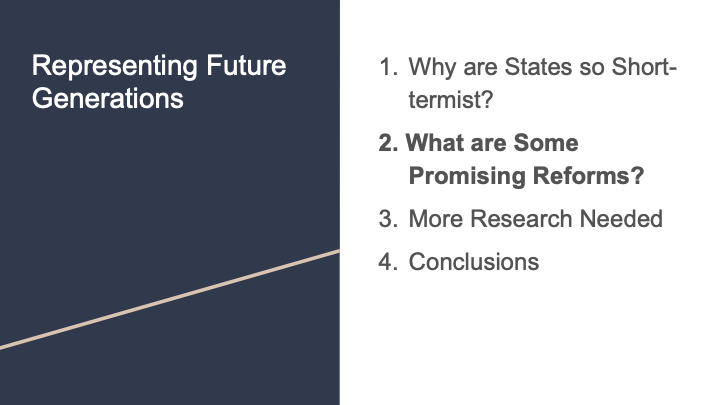
Now that we've looked at the causes of short-termism, let's look at some reforms that could reduce it.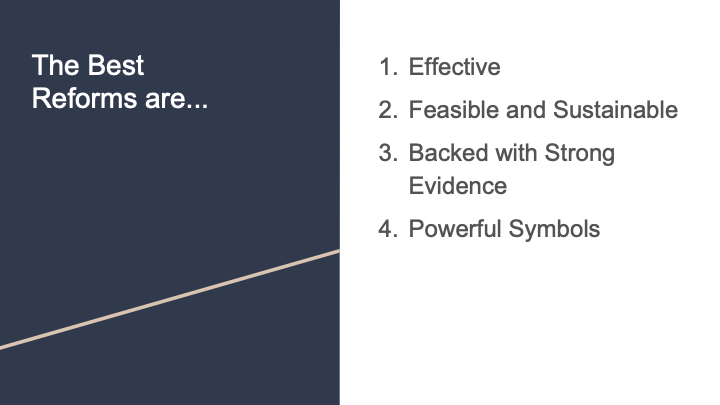
The best reforms will be effective. They'll have a large effect, ideally on very long timelines. They'll be feasible and sustainable — policies that we can actually implement in the world, and that aren't going to be repealed within an election cycle.
There is a very important place for political action that tries to implement much riskier reforms in small jurisdictions. We need people to be taking on political risks so that we can see the effects of those types of policies. But for this part of the presentation, I'm going to prioritize interventions that are easy to implement in the near future.
In addition to being feasible and sustainable, interventions should be backed by strong evidence. And this relates to feasibility and sustainability; politicians don't want to be test subjects. They want to support and back policies that are proven to be effective. If there's good academic evidence that an intervention has been successfully implemented before, that'll help the feasibility and sustainability of the institution.
Finally, reforms should ideally be powerful symbols, signaling to everyone the world over that the future is of great importance, and that political short-termism is a [problem] that must be ameliorated.
In considering these characteristics of good reforms [collectively], let's look at three different possible reforms that we could be implementing in the near future for long-term gain.
The first reform involves creating government research institutes for future generations. This is pretty self-explanatory. These research institutes would be in some office of the state, and would focus on finding relevant information about policies that affect the long-run future — and about the long-run future itself.
There have been variants of this employed in Singapore. The Centre for Strategic Futures (CSF) is there in the prime minister's office. It has really helped Singapore, especially in thinking about low risks of very bad events. Scotland has Scotland’s Futures Forum. Finland has a parliamentary committee that serves as a think tank for matters of long-term interest. And the US, once upon a time, had the Office of Technology Assessment (OTA). Despite its name, it evolved into an institute that was engaging not just in technological prediction, but also in other kinds of prediction that were of long-term importance to the US, until the institute was abolished in the 1990s.
You might hear about the OTA soon, because there have been a lot of policy wonks calling for its reestablishment. They've argued that the elimination of the OTA was extremely harmful to the US's ability to think about the long term. And there's actually a bill in the House now supporting its reestablishment.
Again, these institutions will gather information about the future. But they can also have various archiving responsibilities; they can archive facts about who supported what kinds of policies, and what the effects were. This will allow us to simplify policy causation, and better understand who is supporting good policy and what good policy even looks like.
If these institutions for future generations are able to play these two roles, they can serve an epistemic and a motivational role in ameliorating the effects of short-termism by giving us more information — and by making the risks and consequences salient to the general public and to various political actors. That would create some political pressure for politicians to implement beneficial long-term interventions.
Also, these institutes tend to be low-cost. I have some personal experience in this matter. Academics are pretty cheap; we're not paid a whole lot. If the government hires several academics to be part of a research institute, it doesn't generally cost very much. It should also be relatively nonpartisan compared to a lot of other interventions we might seek, because the researchers are just getting information.
The best research institutes for future generations are independent and separate from government influence — in particular, the political business cycle. We don't want these institutes to get wrapped up in the government's own short-termism.
They should have a broad scope to consider all different areas of long-term interest and balanced tradeoffs between them. And they should have excellent access to information so that researchers can do their job.
Overall, I think research institutes for future generations [represent] quite a promising policy that should be pursued much more. I hope the OTA is established.
Second, we should consider posterity impact assessments. These are similar to their cousin, environmental impact assessments, which are ubiquitously required all over the world for bills that are proposed, construction projects, and other kinds of activities that could negatively affect the environment. Environmental impact assessments are widely hailed as a common-sense [intervention] that gives us much more information about the impacts of our actions.
The UK Future Generations Bill, which has been supported by Lord [John] Bird, is a great bill. It proposes posterity impact assessments for the UK, and states that any proposed bill needs to either assess the impact of that bill on the future for the next 25 years or explain why such an impact assessment hasn’t been done.
The Future Generations bill also proposes a few other policies, which I [endorse] but won't be able to discuss today. [Its authors] proposed a joint select committee in the UK, as well as a commissioner for future generations, to set several well-being targets for the long-term future and [create] some kind of soft-power institution that's able to persuade public bodies to pursue these goals. But for now our focus is on the posterity impact assessments.
Posterity impact assessments play both an epistemic and a motivational role. They give us information about the impact of policy and they can serve as a good liability mechanism to ensure that politicians don't take actions which adversely affect the long-term future, or if they do, find ways to mitigate those effects on the future.
It's a relatively low-risk policy. Not a lot can go wrong unless these impact assessments become quite obstructive and slow the gears of government. Also, the policy should be fairly low in its partisanship, because [it’s just enabling us to learn] about the future impacts of policy interventions.
Ideal posterity impact assessments are applicable to most of the decisions that government actors make. They're enforceable, whether through public sanctions or a court system, and they should not have a budget window or a rate of pure time preference. So, to critique the Bird bill for a moment, they shouldn't evaluate impacts for a certain period of time; ideally, they should evaluate impacts in perpetuity, because otherwise, political actors can shift the burdens of policy outside of the budget window. That’s harder to do on 25-year timelines — it’s laudable that it's such a long timeline in the Future Generations bill — but it’s still possible.
The third promising reform is futures assemblies. These are a kind of citizens’ assembly that fulfills the explicit role of representing future generations. What's a citizens’ assembly? It’s a randomly selected body of ordinary citizens who are brought into one room to deliberate matters of policy. They function as a soft-power political institution by making recommendations to government based on their deliberations. These citizens’ assemblies have been employed in the UK, Ireland, Canada, and other countries.
Futures assemblies [should be]:
* Informed. They're empowered to bring in experts to inform the decision-making process.
* Made up of a stratified random sample of the population. They should be perfectly statistically representative of the larger population.
* Unelected. This means there are no perverse electability incentives.
* Financially independent. There are no fundraising incentives.
* Nonpartisan. They're just people brought together in a room, not members of political parties who are beholden to those parties.
* Deliberative. They discuss relevant issues and tend to reduce partisan polarization — people typically converge toward the middle on their viewpoints rather than becoming more polarized.
[Given these benefits], a citizens’ assembly seems like a nice way of reducing polarization, and increasing cooperation and serious deliberative thought about the long term.
A futures assembly, which serves the purpose of explicitly representing future generations, solves some institutional problems — namely, perverse election fundraising and party incentives. It also has an important motivational and epistemic role. These futures assemblies bring in experts to think about good policy. Therefore, we should learn a lot more about what good policy in the long term would be. They also motivate the state to cooperate with what the citizens’ assembly has asked for, because again, they are a statistically representative sample of the US public, and if the government's systematically ignoring them, that smells of illegitimacy and threatens public approval.
Futures assemblies should ideally be large. This is to reduce corruption. If most of the members can be picked off by industry, that's not going to look good. They should be focused exclusively on the future. Although that entails examining a variety of issues, in a sense it’s a single issue. This is so that the members of the citizens’ assembly can build expertise in a short period of time. [People] should be well paid to participate. That way, they can come from all kinds of economic strata; this also helps to prevent corruption. Finally, they should have short terms so that the assembly is continuously cycling through members, which is another way to help prevent corruption.
We've gone through futures assemblies, posterity impact assessments, and government research institutes for future generations. I think these are three promising policies that are very strongly supported with evidence. We could be taking them forward right now to implement in governments.
Areas in need of more research
I want to turn now to a few policies requiring further research before we can determine whether they’re promising.
The first is pay-for-performance. Pay-for-performance is widely used in the private sector, but it's not used in the public sector. The reasons for this are complicated. There's a very lively debate about whether pay-for-performance would work well in the public sector. There's some evidence suggesting that public servants are more intrinsically motivated than motivated by pay, [which would imply that pay-for-performance wouldn’t] work very well, but this needs a lot more [research]. It could be that certain pay schemes would help incentivize public service workers to think about the long-term future. Some possibilities are to tie their pension payment to their performance or the government's performance.
This idea was suggested to me by Will MacAskill and Aron Vallinder. But there are some issues with it, because public service workers will want financial stability late in life, as Danny Bressler has pointed out to me. Therefore, I think that how pay-for-performance might be structured, and whether it would be beneficial, needs much more attention. 
A second issue is longer election cycles. There's literature on term limits, but only a few studies on whether longer election cycles make legislation more efficient and better. And there's very little on whether it actually decreases the amount of short-termism among political actors. So this needs much more attention, but there's an a priori case for thinking that it would decrease short-termism among political actors — namely by reducing election incentives so that people can act over slightly longer timelines and worry slightly less about re-election.
Third is Demeny voting [named after demographer Paul Demeny, who devised it]. Demeny voting means giving additional votes to parents so that they can vote on behalf of their children. There's some evidence coming out of Kochi University’s Research Institute for Future Design that when parents vote explicitly on behalf of their own children, they vote in a more long-termist way. And we could implement this not just for parents, but also for people without children (and just tell them to vote on behalf of future citizens). The evidence on Demeny voting suggests it might have a significant effect on what kinds of representatives are elected. But again, it needs much more research.
The fourth is intergenerational externality taxes. This is essentially just broadening the very promising reform of carbon taxes to include all kinds of actions and policies which impose long-term externalities. One fun example that Will MacAskill raised is helium. Helium's a nonrenewable resource; you use it, and it just floats away. There was a brief period when we were quite concerned that the US helium reserve was going to be depleted. That would be bad because it's not only used to blow up balloon animals, but also to support rockets and various kinds of magnetic imagery in hospitals.
It turns out that we have much more helium than we thought we did, but this is a good example of how various consumption and production decisions can have positive and negative effects on the long-term future, which might be regulated efficiently through pricing with externality taxes. 
Finally, many long-term issues require strong global governance on behalf of many actors to ensure that these public goods are preserved. We see this starkly in the cases of climate change, AI governance, and nuclear warfare, which are three different causes that EAs care quite a bit about. There's been a lot of talk and research in the EA community on what good global governance would look like. I think this should continue under the broad umbrella of thinking about how we can make the world’s governments less short-termist and more focused on the long term.
Again, these are areas where there's nothing that I know of that we can implement right away, but there's a lot of promise, and good research is needed.
In the long run, I think that the kinds of moderate interventions that I've been talking about are not going to suffice. They will be too weak to make states long-termist in the way that effective altruists want, and we'll need much more robust, energetic interventions over the long run. More energetic interventions are likely to be repealed if they pass at the present time. But over the long run, we really need to employ interventions in every area of government in order to help reduce short-termism significantly.
We could have a Chamber for the Future in the legislative branch, on par with the Senate and the House of Representatives. We could have a Secretary of Future Generations, who could sit in the Cabinet and run various executive agencies, which control machinery to benefit the long-term future. And we could have a Court of Generations which strikes down laws that are in contempt of future generations.
These are all very speculative and, again, not well-supported interventions; there's not very much evidence about whether they'd be good or bad. But they are the kinds of utopian reforms that we need to start thinking about so that we can implement strong institutions to benefit the long-run future. I'd like to see more research on them as well.
I've talked about why states are short-termist, what some promising reforms might be, and then I've concluded with some areas that could use further research. In closing, I want to note that, given the different promising reforms in the areas where research is needed, the issues of political short-termism are serious — but they're not necessary, and they're not inevitable. If we can re-engineer all governments to be much less short-termist and much more focused on the long term, then we'd have the ability to use the $25 trillion of global government resources annually to promote the long-term future. We'd be able to use their profound, normative authority and coercive control over every human being on the planet to ensure that we make the future go as well as possible.
I'd like to thank all of the listed commentators and supporters for their help with this project. And thanks very much [for listening].